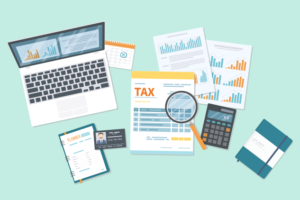Certain entrepreneurs are considered independent contractors by the IRS and may need extra tax tips to help maximize their deductions. If you receive a 1099 form come tax season, you are one of these independent contractors and must pay income tax plus an additional self-employment tax that covers the Social Security and Medicare taxes that are withheld by most employers.
To ease this additional tax burden, there are a few ways independent contractors can claim as many deductions as possible to reduce their taxable income, including keeping records, tracking automobile expenses and more. While the following is not meant to substitute for professional advice — we recommend consulting a tax professional before filing — here are some habits you can keep throughout the year so you can maximize your deductions as an independent contractor:
Track Automobile Expenses
Tax records are essential for any small business owner, saving you stress, bringing you larger deductions and keeping you prepared for potential audits. In an audit, the IRS pays close attention to your personal vehicle use for business, so track all your auto expenses carefully.
When deducting auto expenses, independent contractors can claim a flat standard mileage rate — a specific dollar amount for each mile driven — at $0.625 per mile in 2022. To file using the standard rate, you must own or lease your car and meet certain conditions laid out by the IRS, including not operating five or more cars at the same time for your business.
Another method for tracking miles is to track every business-related mile on your car and add depreciation. Depreciation is the IRS calculation that allows you to recover the cost of using your property for business over time. This is the more complicated method of expense tracking but can sometimes yield better deductions.
In an audit, the IRS pays close attention to your personal vehicle use for business, so track all your auto expenses carefully.
Regardless of whether you claim your exact mileage or a flat rate, you must track your mileage either way. When you keep a mileage log for business, be sure you track three pieces of information:
- Date of travel.
- Business purpose, including client name and reason for meeting (e.g., annual review or company event).
- To and from addresses, including mileage from beginning to end of trip.
Technology has made tracking mileage a lot easier in recent years through apps like MileIQ or Trip Log. Don’t forget to include fees from tolls or parking in your auto expenses as well.
Home Office Deductions
You can deduct the cost of maintaining a home office if you used part of your house exclusively for your business on a regular basis. You can either deduct $5 for every square foot of your house that makes up your home office (up to $1,500) or add up portions of the following and take a standard deduction based on that amount:
- HOA dues
- Repairs
- Lawn service
- Pest control
- Utilities
- Mortgage interest
- Real Estate taxes
- Home insurance
Travel Documentation
Keep all of your tax records for at least five years, including proof of attendance for any out-of-town business events. For FFS events like Leaders Convention and Level Up, be sure to keep your itinerary and other flyers or handouts — these serve as good records of the event for your deductions.
Track the amount you spend on meals, lodging and transportation during business trips. Again, log the dates of travel, the locations and the reason or business benefit for each expense. Cleaning, laundry, telephone and Wi-Fi can also be deductible.
Meals must relate directly to your business to be deductible and cannot be excessive. For 2022, business can generally deduct the full cost of food purchased from restaurants. Previously, the limit was 50% of the cost of the meal — this rule may return in the future, so be sure to check the IRS rules for each filing period.
For your records, keep all receipts and include the business reason for the event, the amount paid, time and place, type of entertainment (meal, etc.) and occupations of those accompanying you.
Keep all of your records for five years, including proof of attendance for any out-of-town business events.
Keep Records and Consult a Tax Professional
When in doubt, it’s better to save something for your records than throw it away when you may need it in the future. To ensure you are filing properly and maximizing your deductions, consult a tax professional before you file — while these tax tips serve as a beginner’s guide for independent contractors, every tax situation is specific to the individual. Only a tax professional can see the full picture and help you file with peace of mind.
FFS Agents — share this post with your networks using our resources in the ABO.




